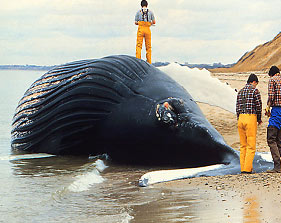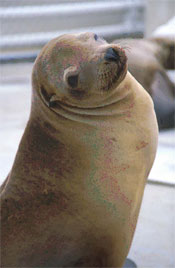You are here: Home › Stressors › Extreme Natural Events › Harmful Algal Blooms › Current Programs › CSCOR Harmful Algal Bloom Event Response Program
CSCOR Harmful Algal Bloom Event Response Program
Issue
Over the past decade harmful algal blooms (HABs) have increased along U.S. coasts causing major resource, economic, and health impacts. State and Federal managers responding to blooms often lack timely access to cutting-edge science useful in minimizing HAB impacts on coastal communities. The NCCOS Center for Sponsored Coastal Ocean Research (CSCOR) HAB Event Response program addresses the need to inject science into management by supporting coastal managers faced with responding to unusual or unexpected HABs.
Approach

Upon notification of an event, CSCOR and its partner, the National Office for Marine Biotoxins and Harmful Algal Blooms at the Woods Hole Oceanographic Institution, will work to provide access to the best technology and expertise available, provide supplemental financial support for investigating a unique event, and ensure proper scientific documentation to add to the HAB knowledge base.
Limited funding is available, so only modest requests to help defray costs of immediate mobilization of sampling, supplies and analytical services are considered. Further, due to limited resources CSCOR prioritizes three types of events:
- Appearance of species, toxicity or harmful impacts which are unusual or unique for a particular U.S. coastal region and pose threats to public health and/or economically vital resources or which may lead to new discoveries in HAB science
- Sudden or unexplained mortalities of seabirds, fish, or marine mammals for which a HAB linkage is suspected but which requires confirmation through additional sampling or observations
- HAB events with major management or resource impacts for which additional data such as the size or extent of the outbreak, causative species, hydrographic characteristics of the associated water mass will be of use in subsequent management decisions.
View past program accomplishments for further illustration of CSCOR priority responses
Applying for Event Response Assistance
- Scientists or management officials can initiate requests for assistance by sending an email to CSCOR HAB program staff at CSCOR.HAB_Event_Response@noaa.gov.
- After an event is proposed to CSCOR staff members, the National Office and other members of the HAB community are consulted as necessary to determine a recommended course of action.
- If the potential for event
response support is determined, the applicant will be asked to
submit a brief, formal request to CSCOR. A formal request should
include the following:
- Description of the events/ impacts and need for urgency
- Intended response plan
- CV for the Principal Investigator
- Listing of managers and researchers involved
- Explanation of assistance/ support needed
- Brief budget and budget justification if funds are requested
- Requirements also include reporting important preliminary results to CSCOR and submitting a brief, written final report. It is also the responsibility of the investigator receiving funds to notify the MERHAB program manager about publications resulting wholly or in part from Event Response funding.
Accomplishments

Since partnering with the National Office for Marine Biotoxins and Harmful Algal Blooms in 2003, the CSCOR Event Response Program has responded to over 10 HAB events impacting states along the East, Gulf and West Coasts . These responses have addressed a wide range of state and federal management and scientific needs-from assessing human health risks, identifying causes of marine mammal mortalities, offering training opportunities for managers, to establishing baseline conditions for new or re-emerging HABs.
CSCOR Event Responses
2007
- Investigating Fish Killing Karlodinium bloom in Weeks Bay, Alabama
- Investigating Extent and Impacts of Cochlodinium bloom in Chesapeake Bay and Tributaries
2006
- Mitigating Impacts of Fish Killing Algal Bloom in Puget Sound, Washington
- Monitoring in Casco Bay, Maine, during Alexandrium HAB Event
- Monitoring for Alexandrium in Gulf of Maine
2005
- Texas Red Tide
- Karenia brevis, Low Oxygen, and Benthic Mortalities in Florida
- Alexandrium fundyense bloom in Massachusetts Bay and Expanded Efforts in New England
- Harmful Algal Bloom Training in Oregon
- Reappearance of the Texas Brown Tide in Upper Laguna Madre, Texas
2004
- Great Blue Heron Steatitis in Maryland
- Cyanotoxin sampling in the Potomac River and Chesapeake Bay
- Bottlenose Dolphin Mortality in the Florida Panhandle
2003
- Cyanobacterial Toxicity in Upper San Francisco Bay
- Georges Bank Whale Mortalities
For more information, contact:
NOAA/NOS/NCCOS/CSCOR HAB event Response Program co-managers:
Marc Suddleson
MERHAB manager
301-713-3338
marc.suddleson@noaa.gov
Quay Dortch
ECOHAB Coordinator
301-713-3338
quay.dortch@noaa.gov
For prompt attention e-mail Marc and Quay at CSCOR.HAB_Event_Response@noaa.gov
Use of this e-mail address will help CSCOR provide prompt attention to your event response inquiry. Quay, Marc and other designated CSCOR staff will monitor this address .

